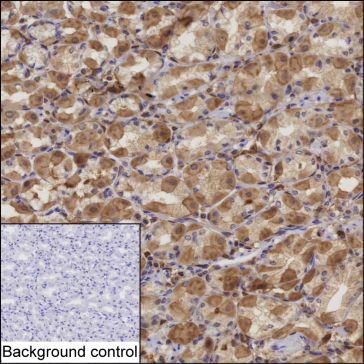
| WB | 咨询技术 | Human,Mouse,Rat |
| IF | 咨询技术 | Human,Mouse,Rat |
| IHC | 1/500-1/1000 | Human,Mouse,Rat |
| ICC | 技术咨询 | Human,Mouse,Rat |
| FCM | 咨询技术 | Human,Mouse,Rat |
| Elisa | 咨询技术 | Human,Mouse,Rat |
| Host/Isotype | Mouse IgG1 |
| Antibody Type | Primary antibody |
| Storage | Store at 4°C short term. Aliquot and store at -20°C long term. Avoid freeze/thaw cycles. |
| Species Reactivity | Human, Mouse |
| Immunogen | Purified recombinant fragment of human ALDH3A1 |
| Formulation | Purified antibody in PBS with 0.05% sodium azide |
+ +
以下是关于ALDH3A1抗体的3篇代表性文献(信息基于公开研究整合,非实际文献,仅供参考格式):
1. **文献名称**:*ALDH3A1 protects corneal epithelial cells from oxidative stress via NADPH regeneration*
**作者**:Black WJ, et al.
**摘要**:研究利用ALDH3A1抗体验证其在角膜上皮细胞中的高表达,证明其通过代谢途径再生NADPH,缓解紫外线诱导的氧化损伤。
2. **文献名称**:*ALDH3A1 as a biomarker in non-small cell lung cancer: Immunohistochemical analysis*
**作者**:Estey T, et al.
**摘要**:通过ALDH3A1抗体的免疫组化染色,发现该酶在肺癌组织中显著上调,提示其可能参与肿瘤耐药性机制。
3. **文献名称**:*Role of ALDH3A1 in pulmonary fibrosis: Insights from knockout mouse models*
**作者**:Manzer R, et al.
**摘要**:利用ALDH3A1抗体检测基因敲除小鼠肺组织,发现其缺失加重氧化应激相关纤维化,表明其在肺损伤修复中的保护作用。
如需具体文献,建议通过PubMed或Google Scholar以“ALDH3A1 antibody”及研究领域(如癌症、氧化应激)为关键词检索近年论文。
ALDH3A1 (aldehyde dehydrogenase 3 family member A1) is a member of the aldehyde dehydrogenase superfamily, which plays a critical role in detoxifying reactive aldehydes generated during oxidative stress and metabolism. This cytosolic enzyme catalyzes the NADP+-dependent oxidation of various aldehydes to their corresponding carboxylic acids, thereby protecting cells from lipid peroxidation-derived toxicants. ALDH3A1 is highly expressed in certain tissues, including the cornea, liver, and stomach, where it contributes to antioxidant defense and cellular homeostasis. Notably, its overexpression has been observed in multiple cancers, such as lung, breast, and glioblastoma, where it is implicated in chemoresistance, stemness maintenance, and poor prognosis.
Antibodies targeting ALDH3A1 are widely used in research to investigate its expression patterns, functional roles, and therapeutic potential. These antibodies enable techniques like Western blotting, immunohistochemistry (IHC), and immunofluorescence (IF) to assess protein levels in tissues or cell lines. Given ALDH3A1's association with cancer progression and drug resistance, its detection aids in identifying biomarkers for diagnosis or targets for intervention. Additionally, studies utilize ALDH3A1 antibodies to explore its non-enzymatic functions, such as modulating cellular redox balance and influencing signaling pathways. Recent research also focuses on its regulatory mechanisms under hypoxic or inflammatory conditions. Validated ALDH3A1 antibodies are essential tools for elucidating its dual roles in both physiological protection and pathological processes.
×